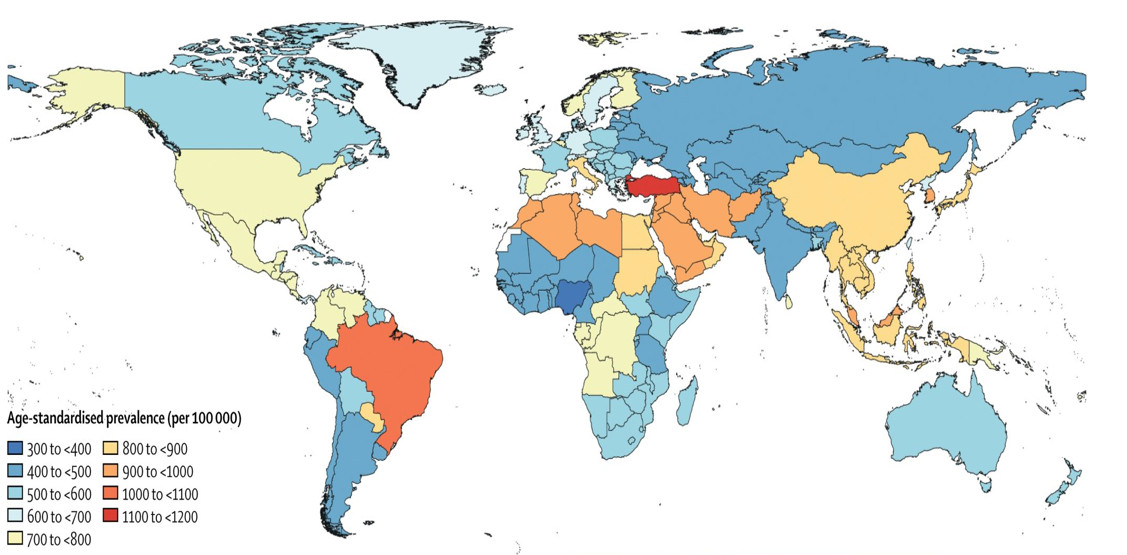
Health & Medicine
How good cholesterol can keep women’s brains healthy

Dementia cases have doubled over the past 25 years, creating enormous health challenges around the world. So, it’s important that we act on evolving health advice…and that means exercising
Published 20 December 2018
If you are worried about dementia, you should be.
For many older people, Alzheimer’s dementia has replaced cancer as the great health fear of a generation. Dementia is now the leading cause of death in Australian women, and second leading cause of death in men.

The disease is more common at older ages, but from as young as 50, according to a new paper in The Lancet Neurology, the number of us living with dementia doubles every five years older we get.
The data was gathered from the Global Burden of Disease project, which was co-founded by University of Melbourne Professor Alan Lopez; it collects death data in places where it wasn’t previously recorded, which is then used to improve our understanding of health around the world.
The most common dementia is Alzheimer’s disease, which affects memory, thinking skills, emotions, behaviour and mood – and it’s terminal. Despite hundreds of drug trials, Alzheimer’s has no cure.
Each year, treatments improve and survival rates increase for other diseases, but as yet, not for Alzheimer’s. It’s debilitating and progressive – robbing you of your faculties and finally your life after years of degeneration.

Health & Medicine
How good cholesterol can keep women’s brains healthy
The new paper, co-authored by the University of Melbourne Healthy Ageing Program group leader Professor Cassandra Szoeke, shows that the global number of people living with dementia more than doubled between 1990 and 2016, from 20.2 million to 43.8 million.
On top of that, it is estimated that 25 per cent more cases remain undiagnosed.
While global concerns about Alzheimer’s are real and it will have a big impact, Professor Szoeke says some cases are preventable.
Other research indicates that while prevalence is increasing with our ageing populations, improved nutrition, health and healthcare could be reducing the cases of dementia.
“This is good news,” Professor Szoeke says.

“In the USA, dementia rates for those aged over 65 have fallen in the past few years from 12 per cent to 10.5 per cent. The Danish centenarian study also suggested that dementia wasn’t inevitable with age.”
However, Australian health professionals are concerned that these beneficial trends could be reversed by rising obesity rates and reduced physical activity.
Various studies have reported anywhere from30-50 per cent of dementia is preventable. A recent global study found that almost a quarter of cases were due to being overweight, smoking, high blood sugar and consuming a lot of sugar sweetened beverages.

Arts & Culture
How music could revolutionise dementia care
University of Melbourne PhD student Edward Hill’s recent thesis also found that what we eat has an impact on brain health.
“People with a largely junk food diet are more likely to have higher amyloid load in the brain,” Mr Hill says.
“Amyloid is the protein associated with the most common dementia, Alzheimer’s dementia. The gold standard of diagnosis for Alzheimer’s remains post-mortem brain samples which show the presence of this amyloid and ‘tau tangles’ in the brain.”
Professor Szoeke says that, ironically, for previous generations the most common illnesses were caused by a lack of access to good nutrition.
“But we now seem to suffer more from excess, with Australians reportedly among the world’s most overweight people,” she says.

“Despite an abundance of fresh food, choosing refined sugar and high calorie foods is leading to problems exacerbated by decreased activity in our leisure and work time. The resulting obesity then increases rates of diabetes, heart and blood vessel health problems.
“All are known risks for vascular and Alzheimer’s dementia.”
Key here is the role of sugar.

Health & Medicine
Exercising in middle age can save your memory later
A recent study by Tufts University’s Friedman School of Nutrition Science and Policy found Australia and New Zealand were the highest fruit-juice consuming nations in the world. Australia is also among the world’s top-10 highest soft-drink consuming countries per-capita, according to the Australian Bureau of Statistics (ABS).
And this could be a big problem for the next generation. According to the ABS, our kids consume 16 per cent more sugar sweetened beverages than adults.
Professor Szoeke says the public remains understandably cynical about health advice that changes as more evidence accrues.
“In the 1970s, many people gave up butter following advice that dairy fat and cholesterol were harmful, only to be told later that the trans-fat in margarine was even worse,” Professor Szoeke says.
Research has shown strong associations between high cholesterol and later-life dementia, but treating cholesterol hasn’t demonstrated the expected success.

Other researchers have since re-examined the research and found that while increased cholesterol was a risk in younger people, it protected the elderly against disease. So it’s crucial to consider the timing and duration of risks when you are dealing with chronic diseases that take decades to develop.
“What is a risk at one time in your life may not be a risk at another,” Professor Szoeke says.
Changing or inconsistent advice can make the public resistant to new health messages.

Health & Medicine
How much exercise keeps our brains healthy as we age?
According to Professor Szoeke, we need high-quality disease data delivered to the public with assurance and clarity.
“Some encouraging findings have shown improved cognitive performance after intervention over a few years,” she says. “But, the long-term impact on the midlife to later-life risk of developing dementia remains unclear. That proof might involve a randomised controlled trial over 30 years of disease development. But this is clearly too long as we need answers today.”
For now, researchers are looking for this information in older studies that followed people for extended periods. Many weren’t designed for this purpose and don’t have early cognitive testing or blood samples stored for later testing.
But dogged researchers have discovered some important bits of information by combining huge data sets from multiple studies to examine the timing and duration of these risks, which are interconnected. This will, in turn, contribute to person-centred health guidelines with advice that is likely to change every decade.

So, while the research continues, what can you do now to reduce your dementia risk?
“If there is just one thing to do for your health in the New Year, be more active each day and combine that with eating healthy,” says Professor Szoeke.
“Being active each day can improve your heart, burns calories, reduces inflammatory factors and probably some other effects we don’t even understand yet.
“It will give you the best chance of healthy ageing.”
The Healthy Brain Initiative’s research is available to all Australians on Twitter.
Professor Cassandra Szoeke’s new book Secrets of Women’s Healthy Ageing is now available to buy online through Melbourne University Publishing.
Banner Image: Getty Images